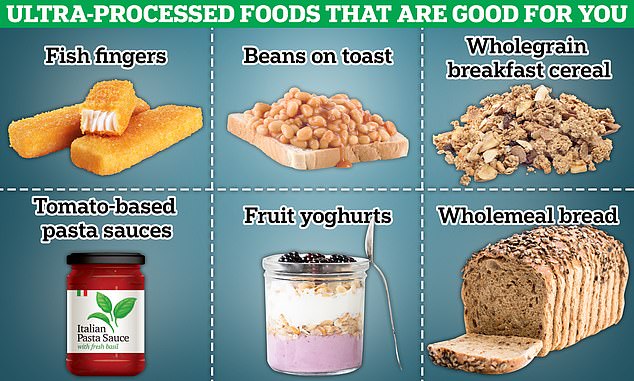Fresh ultra-processed food warning: Eating more meals like ice cream, frozen pizzas and soda increases stroke risk by as much as 8 percent
Eating a lot of chips, cookies and soda can lead to a higher risk of memory problems and stroke, according to a new study.
Experts have found that there may be a link between a diet high in ultra-processed foods and the likelihood of cognitive decline and life-threatening medical conditions.
These foods tend to be high in added sugars, fats and salt, and low in protein and fiber.
They also include ice cream, hamburgers, ketchup, mayonnaise, packaged bread and flavored cereals.
Developed by scientists in Brazil more than a decade ago, the Nova system divides food into four groups based on the amount of processing it has undergone. Unprocessed foods include fruits, vegetables, nuts, eggs and meat. Processed culinary ingredients – which are not usually eaten alone – include oils, butter, sugar and salt

Food experts say some UPFs can be “part of a healthy diet.” Baked beans, fish fingers and wholemeal bread all do the trick, according to the British Nutrition Foundation (BNF). Tomato-based pasta sauces, wholegrain cereals and fruit yoghurts are also ‘healthier processed foods’, says the charity
Unprocessed – or minimally processed – foods, on the other hand, include meats such as simple cuts of beef, pork and chicken, and fruits and vegetables.
A team from Massachusetts General Hospital in Boston analyzed 30,239 people aged 45 or older who were followed for an average of eleven years.
Participants filled out questionnaires about what they ate and drank, which allowed the researchers to determine how much ultra-processed food each person ate on average per day.
That percentage was then calculated in four groups, ranging from the least processed foods to the most processed foods.
At the end of the study, 768 people were diagnosed with cognitive impairment and 1,108 people had a stroke.
Analysis found that a 10 percent increase in the amount of ultra-processed foods eaten was associated with a 16 percent higher risk of being diagnosed with cognitive impairment.
However, eating more whole foods was associated with a 12 percent lower risk of cognitive impairment.
Meanwhile, greater intake of ultra-processed foods was associated with an 8 percent increased risk of stroke.
Greater intake of less processed foods was linked to a 9 percent lower risk of stroke.
Study author Dr William Kimberley said: ‘While a healthy diet is important for maintaining brain health in older adults, the most important nutritional choices for your brain remain unclear.
‘We found that increased consumption of ultra-processed foods was associated with a higher risk of both stroke and cognitive impairment.
‘Our findings show that the amount of food processing plays an important role in overall brain health.
‘More research is needed to confirm these results and to better understand which food or processing components contribute most to these effects.’
The findings have been published in the journal Neurology.
A separate study published earlier this year suggested that ultra-processed meats such as chicken nuggets and hot dogs can increase the risk of premature death by 13 percent.
Harvard University researchers who monitored the diets of more than 114,000 middle-aged nurses and healthcare workers in the United States for 30 years discovered a link between consumption of mass-produced foods and the risk of premature death.
Diets high in ready-to-eat processed meat and fish products were found to be the most harmful, increasing the risk of premature death by 13 percent.
This category includes items such as store-bought sausages, burgers, fish sticks, chicken nuggets and turkey twizzlers.
